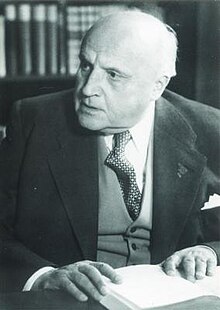| Erhard Schmidt | |
|---|---|
 Erhard Schmidt (courtesy MFO) Erhard Schmidt (courtesy MFO) | |
| Born | (1876-01-13)13 January 1876 Tartu, Governorate of Livonia (now Estonia) |
| Died | 6 December 1959(1959-12-06) (aged 83) Berlin |
| Alma mater | University of Göttingen |
| Known for | Schmidt decomposition Gram–Schmidt process Hilbert–Schmidt operator Hilbert–Schmidt integral operator Singular value |
| Scientific career | |
| Fields | Mathematics |
| Thesis | Entwickelung willkürlicher Functionen nach Systemen vorgeschriebener (1905) |
| Doctoral advisor | David Hilbert |
| Doctoral students | Salomon Bochner Alfred Brauer Richard Brauer Lothar Collatz Alexander Dinghas Michael Golomb Guido Hoheisel Eberhard Hopf Heinz Hopf Martin Kneser Wilhelm Specht |
Erhard Schmidt (13 January 1876 – 6 December 1959) was a Baltic German mathematician whose work significantly influenced the direction of mathematics in the twentieth century. Schmidt was born in Tartu (German: Dorpat), in the Governorate of Livonia (now Estonia).
Mathematics
His advisor was David Hilbert and he was awarded his doctorate from University of Göttingen in 1905. His doctoral dissertation was entitled Entwickelung willkürlicher Funktionen nach Systemen vorgeschriebener and was a work on integral equations. Together with David Hilbert he made important contributions to functional analysis. Ernst Zermelo credited conversations with Schmidt for the idea and method for his classic 1904 proof of the Well-ordering theorem from an "Axiom of choice", which has become an integral part of modern set theory.
After the war, in 1948, Schmidt founded and became the first editor-in-chief of the journal Mathematische Nachrichten.
National Socialism
During World War II Schmidt held positions of authority at the University of Berlin and had to carry out various Nazi resolutions against the Jews—a job that he apparently did not do well, since he was criticized at one point for not understanding the "Jewish question". At the celebration of Schmidt's 75th birthday in 1951 a prominent Jewish mathematician, Hans Freudenthal, who had survived the Nazi years, spoke of the difficulties that Schmidt faced during that period without criticism. Schmidt was, however, a conservative and a nationalist, and defended Hitler after Kristallnacht, telling Issai Schur that "Suppose we had to fight a war to rearm Germany, unite with Austria, liberate the Saar and the German part of Czechoslovakia. Such a war would have cost us half a million young men. But everybody would have admired our victorious leader. Now, Hitler has sacrificed half a million Jews and has achieved great things for Germany. I hope some day you will be recompensed but I am still grateful to Hitler".
See also
Notes
- ^ Erhard Schmidt at the Mathematics Genealogy Project
- ^ O'Connor, John J.; Robertson, Edmund F., "Erhard Schmidt", MacTutor History of Mathematics Archive, University of St Andrews
- Zermelo 1904, pp. 514, 516.
- Sanford L. Segal, Mathematicians Under the Nazis, Princeton University Press 2003, Page 358.
References
- Zermelo, Ernst (1904). "Beweis, daß jede Menge wohlgeordnet werden kann". Mathematische Annalen (in German). 59 (4): 514–516. doi:10.1007/BF01445300. S2CID 124189935. Archived from the original on 5 March 2016. Retrieved 3 January 2016. Reprinted in English translation as "Proof that every set can be well-ordered", van Heijenoort 1976, pp. 139–141.
- 1876 births
- 1959 deaths
- Scientists from Tartu
- People from Kreis Dorpat
- People of Baltic German descent
- 19th-century German mathematicians
- 20th-century German mathematicians
- Linear algebraists
- Academic journal editors
- University of Tartu alumni
- Emigrants from the Russian Empire to Germany
- Recipients of the National Prize of East Germany